2021 WAFWA Award Recipients
The Western Association of Fish and Wildlife Agencies (WAFWA) honored conservation professionals from several western states at their virtual award ceremony at the 2021 WAFWA Summer Conference.
“This evening is always a highlight of WAFWA’s summer meeting. It is such an honor to recognize the accomplishments of our partners and our peers that so critical to the fulfilment of our missions. From the conservation professionals who do the hard work that make our agencies run, to the many partners and volunteers who support us in so many ways…we come together virtually this evening to honor and recognize our peers.”
Tony Wasley, Director of the Nevada Department of Wildlife and chair of WAFWA’s Awards and Recognition Committee.
The 2021 WAFWA Professional Award Recipients
HONORARY LIFETIME MEMBERS
We’re going to get started tonight by recognizing new honorary lifetime members. These are folks who have served their agencies….and WAFWA…. well during their careers. This year, we have seven new lifetime members.
- Martha Williams served Montana Fish, Wildlife & Parks as director for four years and was very involved in WAFWA affairs.
- Mike Fowlks was Director of Utah Division of Wildlife Resources and served as WAFWA’s Board President.
- Terry Steinwand worked for North Dakota Game and Fish Department for 39 years.
- Noreen Walsh served the US Fish & Wildlife Service for 30 years and most recently as a regional director.
- Greg Siekaniec served the US Fish & Wildlife Service as a regional director.
- Jon Sjoberg worked for the Nevada Department of Wildlife and has been instrumental on many WAFWA committees throughout his 41 years of service.
- Stafford Lehr served as a deputy director for California Department of Fish & Wildlife before he retired this spring. He has represented the state of California on WAFWA issues and committees for many years.
We appreciate your many years of service to your states, the federal government…and to WAFWA. Congratulations!
Federal Conservation Partner of the Year
We’re proud to recognize USGS’ Dr. Peter Coates, who is responsible for working as a research wildlife biologist with the Western Ecological Research Center. Peter is being honored with this award for his research associated with Greater and Bi-State Sage Grouse and Common Ravens in the Great Basin. Dr. Coates and his team at WERC also developed statewide seasonal and annual habitat delineations for Nevada, complete with habitat suitability indices that were critical in the development of Nevada’s sage-grouse mitigation program, more formally known as the Conservation Credit System. There are many more examples that we could share but suffice to say, Dr Coates’ contributions to wildlife research have been a huge asset to all western state agencies. Congratulations to our Federal Conservation Partner of the Year: USGS Research Wildlife Biologist Dr. Peter Coates.
Outstanding Citizen Wildlife Contributor of the Year
We’re pleased to announce that Bryan Perchetti from Nevada is this year’s winner. Bryan conceived the idea and encouraged Nevada’s Department of Wildlife to restore trout into some of Nevada’s back country. Perchetti personally released the 3,000 trout in the back country with the help of his wife Tansy and the use of their string of pack horses. Another conservation need that Bryan could see, was the need for a new catwalk on the spillway of Groves Lake reservoir in Kingston Canyon. The original existing wooden walkway was constructed over 50 years ago, unsafe, and in need of repair. One of Bryan’s many talents gained through years of ranching and mining is structure design, fabrication, and welding. It wasn’t long before Bryan was able to have the entire project completed and ready for an engineering stamp of approval. All work on these projects was performed on one hundred percent voluntary basis and took time away from work and ranching.
Financial obstacles were also encountered and paid for by Bryan personally and in the walkway, project funds were authorized by Bryan through his place of employment. Keeping fish alive at the cool temperature required and providing adequate oxygen levels in the water while in transit on pack horse to the higher elevations also required careful planning and expertise. All this occurred in 2020 alone, even as crazy as the year was, he spearheaded and contributed to multiple central Nevada conservation projects. Bryan’s strong passion for conservation is reflected in this work. For his lifelong dedication and commitment to conservation, Bryan is a very deserving recipience of WAFWA’s Outstanding Citizen Wildlife Contributor Award. Please join me in applauding WAFWA’s Outstanding Citizen Wildlife Contributor: Bryan Perchetti.
President’s Award
Dr. Chris Moore is the 2021 recipient of WAFWA’s President’s Award. It’s safe to say WAFWA was going through a pretty rocky time of transition in 2019 with financial instability, key staff turnover and a number of other headwinds to bear. After a couple of failed attempts to hire the right person to serve as WAFWA’s Executive Director upon the retirement of long-standing executive Larry Kruckenburg, Chris fell into our lap. To be fair, it was probably a little more coordinated than a pure coincidence, but there’s no question that Chris arrived at WAFWA as the right man at the right time. Facing some internal budget woes, Chris was able to work with WAFWA to negotiate a no-cost, part-time Interim Executive Director arrangement that allowed the organization to enjoy some badly needed budget relief. We can’t thank his employer, the Mid-Atlantic Fishery Management Council, enough for their willingness to loan Chris to WAFWA for what was to be a 6-12 month stint through the organization’s leadership development program.
Two years later, Chris is still hanging with us on a part-time basis while WAFWA finalizes its search for the best candidate to lead the organization forward on a permanent basis. Without question, Chris has risen to the challenge and quickly gotten up to speed on WAFWA’s operations, its challenges and our strong desire to get on a more focused and sustainable path. Chris has been able to chop (not just shave) expenses to better match revenues to achieve a balanced budget. He has also been able to lead the organization through a 5-year review and critical audit of WAFWA’s Lesser Prairie-chicken Rangewide Conservation Program to identify necessary improvements to better deliver conservation and mitigation in the 5-state LPC range. Now, he’s helping WAFWA get an LPC Program business plan update across the finish line to set this critically important conservation effort on a sustainable path for the future. There are numerous other accomplishments to count during Chris’s tenure, but suffice it to say he has been a sorely needed agent of change in a relatively short amount of time, amazingly all on a part-time basis while juggling his paying job! While we hope for WAFWA’s sake and for the Mid-Atlantic Fishery Management Council’s sake that Chris will ultimately be able to get back to his paying job full-time as promised two years ago, there’s no doubt that WAFWA has benefitted immensely from his handiwork and leadership at WAFWA’s helm the past couple of years. When that ship sails, Chris will be sorely missed and fondly remembered for his positive impact on WAFWA during some of the organization’s most trying times. We can’t thank you enough Chris for your dedication, passion and service for leaving WAFWA a better place than you found it. Godspeed!
Commission/Board of the Year Award
We’re pleased to recognize the Kansas Department of Parks, Wildlife, and Tourism. The Commission has over the past 5 years exhibited exceptional leadership in the field of conservation. The commission increased outdoor opportunities for people with mobility issues when they approved the use golf carts and work utility vehicles on maintained roads in Kansas state parks. Additionally, the Commission grappled with topic of e-bikes, ultimately amending the regulations to allow e-bikes on state park roads and trails in 2019. During the past five years, the KWPT commission has navigated through a variety of controversial and sensitive issues. The commission approved a regulation change that made it illegal to guide hunters commercially on any land owned and managed by the department. This commission has consistently listened to the desires of constituents and balanced them with biological recommendations to maximize opportunities.
This commission, with the stable leadership of Chairman Lauber, has consistently requested input from and listened to both department staff and the public. Dealing with controversial issues such as movement of wildlife-caught bait and preventing the spread of aquatic nuisance species, the commission has shown the leadership to make significant changes, but also the resolve to go back and make corrections when appropriate. Please join me in honoring the Kansas Department of Parks, Wildlife, and Tourism Commission.
Special Recognition Award
This year there are two recipients. The first recipient is Ted Spraker of Alaska. Over the years Ted has consistently volunteered large portions of his time to help the public understand wildlife management, support youth and women outdoor programs, assisting public organizations with his experience, and built positive relationships that contribute to issue resolution involving the many different user groups and government agencies. During his tenure as a wildlife biologist for the Alaska Department of Fish and Game and then later on the Alaska Board of Game, Ted consistently went above and beyond the regular duties and responsibilities of those positions. As the local biologist when a local lice infestation hit the wolf population on the Kenai Peninsula he implemented a successful program of treating wolves that reduced mortality and the spread of lice to other populations. As the area biologist for the Kenai Peninsula Ted also headed up two successful programs that reestablished caribou and introduced ruffed grouse to the Kenai Peninsula.
ln 2002 Ted retired from the Department and in 2004 he was first appointed to the Alaska Board of Game. During his tenure on the Board he was appointed by four different governors, confirmed by six legislatures, and served as vice-chair and chair. Ted also served as the Board’s representative on the Alaska Big Game Commercial Services Board, which regulates big game guides and transporters in Alaska, for 8 years. Ted has demonstrated a strong commitment to the conservation of wildlife as both a public servant and as a volunteer. His contributions have extended nearly 45 years toward the betterment of the management and use of wildlife. He’s significantly contributed to the scientific information and management techniques in support of the State’s management. His respect for people who hold opposing views and efforts to seek solutions has proved invaluable in moving important initiatives forward. Congratulations to Ted Spraker!
Special Recognition Award
Our second recipient of this year’s special recognition award is Major Daniel Hesket from Kansas. Major Daniel Hesket, an assistant law enforcement division director, serves as the State of Kansas boating law administrator with additional supervisory responsibilities over Training, Professional Standards and Emergency Management/Homeland Security Units. In 1989, the Kansas Fish and Game Commission hired Major Hesket to serve as a Game Warden in Russell County following in his father’s footsteps. During this period, Warden Hesket’s primary duties included the enforcement of wildlife, boating, and park laws and regulations of the State of Kansas while conducting investigations and working with the public in his assigned district. He was a hunter safety, boating safety, and fur-harvesting education instructor for the public. It was then that Dan recognized his interest in and talent for management of the boating program.
He was promoted to a statewide boating enforcement specialist in 1993 and during this time Dan helped coordinate and implement selective boating enforcement effo1ts throughout the State. He was instrumental in the development and implementation of a marine/theft prevention program with the agency. He developed and trained officers in boating enforcement procedures, accident investigation and boating laws while maintaining all the duties of a field warden. He served in this capacity until his promotion to Major in 2002. Before Major Hesket took the helm as the State Boating Law Administrator, the condition of the agency’s boating equipment, namely the patrol boats, was in disarray. Through his efforts, there are state-of-the-art patrol boats on almost every Kansas reservoir. In addition, a great number of varied watercrafts, jon boats, airboats, kayaks, and canoes are spread out for Kansas game wardens. During his 32-year career, Major Dan Hesket has worked his way from a district game warden to the dynamic leader of the watercraft program. His vision and accomplishments have transformed the Wildlife, Parks and Tourism’s Law Enforcement Division into a force with cutting edge aquatic capabilities. Major Hesket’s remarkable impact across Kansas deserves recognition amongst his peers. Congratulations, Major Hesket!
Professional of the Year
We’re honoring Don Kemner, recently retired from Idaho Department of Fish & Game. Don retired in early 2021 after a 32 year career with IDFG serving the sportsmen, sportswomen and the general public of Idaho. Don’s career was focused on advancing conservation for wildlife and people through habitat management and improvement. Throughout his career Don mentored and championed many young professionals. He is highly respected by IDFG staff for the positive support and encouragement he provided others as they worked to achieve agency goals and develop their careers. Don’s work on greater sage-grouse issues had not only Idaho implications, but range-wide implications for conservation and management. Don provided strong leadership through his work on the Governor’s Sage Grouse Task Force to develop Idaho’s Sage Grouse Management Plan.
Don was the IDFG representative on WAFWA’s Sage-Grouse Executive Oversight Committee and also served on WAFWA’s Fire and Invasive Working Group. Don’s work has directly contributed to sage-grouse conservation, particularly through habitat conservation and restoration, helping to prevent an ESA listing. Don’s career is an outstanding example of exemplary achievements and contributions to IDFG’s management mission and to wildlife conservation not only within Idaho but in the intermountain west, particularly through his work advancing sage-grouse and rangeland habitat conservation. Please join me in recognizing Don Kemner as WAFWA’s Professional of the Year.
Special Achievement Award
We’re honored Game Warden Sean Flynn from Nevada Department of Wildlife. Game Warden Flynn is being honored with this award for his ability to render critical lifesaving aid, particularly in two incidents this past year in which he conducted rescues. Game Warden Flynn has established himself, in only his second year with the Department, as an unquestioned leader among our boating patrol officers. The skill with which he executes his mission, skills he brought with him from his prior military service, are readily apparent to his coworkers and supervisors. His unselfish actions and valiant service under chaotic and hazardous conditions reflect great credit upon himself and the Nevada Department of Wildlife. He has provided the Nevada Department of Wildlife’s Law Enforcement Division with exceptional leadership, skill, and ingenuity in the performance of his duty, all while bringing credit to the Department in a unique way.
Pogue-Elms Law Enforcement Officer of the Year
This award memorializes Idaho Fish and Game officers Bill Pogue and Conley Elms, who were killed in January 1981 while trying to arrest a poacher in a remote region of southwestern Idaho. Honorees for this award exemplify the lifelong commitment that game wardens and conservation officers across the country dedicate to their work. Wildlife Officer Jonathan Garcia is being honored with WAFWA’s Pogue-Elms Law Enforcement Officer of the Year Award because he is an exceptional team player, and he strives to further his knowledge of Fish and Wildlife enforcement. Garcia has served as a Wildlife Officer for California Department of Fish and Wildlife since 2018. His immense case load has involved a wide variety of violations including but not limited to, illegal take of deer, take of lobster out of season, feeding bears, unlawful importation of restricted species, license fraud, take of mountain lions, take of bear out of season, use of throw-nets and gill nets, and take of band tailed pigeons out of season.
On solo proactive patrols, Garcia arrested two felons for being in possession of firearms and ammunition. In addition, Garcia also filed a case against a convicted felon who took a spike buck with a firearm. The subject was ultimately sentenced to State Prison. Please join me in honoring Jonathan Garcia as this year’s Pogue-Elms Law Enforcement Officer of the Year!
Outstanding WAFWA Contributor of the Year
This award is presented to an employee of a member agency who has made outstanding contributions to a WAFWA-sponsored project or initiative or been deeply engaged in committee or working group activities that directly further the conservation goals and objectives of the Western Association of Fish and Wildlife Agencies. John Hervert is this year’s recipient of the Outstanding WAFWA Contributor of the Year Award.
John Hervert is a veteran wildlife biologist with 42 years of service with the state of Arizona. John has been involved with numerous bighorn sheep translocation efforts – involving approximately three dozen capture efforts in the region alone – that have helped to re-establish or supplement bighorn sheep populations in numerous mountain ranges in Arizona and beyond. One of the more recent restoration efforts he assisted with involved the re-establishment of bighorns in the Catalina Mountains. He also helped to establish standardized aerial capture techniques and he remains one of a handful net gunners and netgun instructors at AGFD. His commitment to training the next generation of wildlife managers in these techniques is driven by his view that it’s an indispensable tool that also requires the highest level of precaution to ensure that it’s safely deployed.
John has also used his capture skills to collar and/or mark bighorn sheep in various ranges within the region to learn more about their use of habitat, how they’re impacted by predation, as well as how far they travel and what corridors they use when moving between ranges and/or crossing potential barriers such as roads and highways. Results of these efforts have helped identify the interconnectedness of populations across mountain ranges separated by many miles of otherwise unsuitable bighorn habitat, and highlighted areas for establishing new water sources or relocating/replacing unreliable systems that are difficult to access and maintain. During the last three years there have been multiple incidents involving stray/feral domestic sheep and goats in bighorn habitat within the region. John understands the critical threat from disease that these incidents present and he ensured an immediate response. Appropriate stakeholders were coordinated with so that removals could occur in a timely manner. John also initiated partnerships within the Yuma community and beyond to attract attention and support for building wildlife waters in southwestern Arizona. His efforts quickly earned the respect of the Yuma Valley Rod and Gun Club and the Arizona Desert Bighorn Sheep Society. His ability to efficiently implement projects on a regular basis enabled him to leverage existing resources with donated materials and equipment along with volunteer labor from these NGOs and others. Together they’ve helped to redevelop and build well over 100 catchments in the region over the last 25 years. John’s dedication to bighorn sheep conservation is evident in the numerous and varied management efforts he’s initiated or assisted with consistently throughout his career. Please join me in congratulating John Hervert!
Phillip W. Schneider Lifetime Achievement Award
And now, the final and most prestigious award of the evening. WAFWA’s Lifetime Achievement Award is named for Phillip W. Schneider of Oregon, whose legendary commitment to fish and wildlife resources spanned more than 40 years in a career in which he served as director of the state’s game and fish agency, and later as a commissioner and commissioner emeritus of Oregon’s Fish and Wildlife Commission.This award recognizes an individual who has dedicated his or her entire career to conservation of fish and wildlife resources in the West.
It is an honor to bestow this award on Paul Kline, Deputy Director of Policy and Programs with Idaho Department of Fish and Game. Paul has worked for IDFG since 1992. Since 2018 he’s served as the Deputy Director of Policy and Programs. Prior to that, he served as the Assistant Chief of Fisheries for 10 years. In both of those roles, Paul has not only been responsible for leading a variety of staff and programs, he’s served as ‘fixer’-when something, anything goes wrong, he has the technical and institutional knowledge and emotional intelligence to work effectively with others to make it right. His organizational skills, diligence, and thoughtfulness are not only legendary, they’ve been an essential element to the success of the Idaho Department of Fish and Game.Paul plays a lead role in our interaction with the Idaho legislature. He has lead responsibility for shepherding forward the agency’s administrative rules and legislation.
Paul also tracks and testifies on other legislation related to IDFG. During Paul’s tenure IDFG has enjoyed an unprecedented 100% success rate with agency sponsored administrative rules and legislation, including a non-resident fee increase. In the broader world of fishery conservation Paul is probably best known as the ‘godfather’ of the Snake River Sockeye Salmon recovery program. Many have joked that Paul has forgotten more than anyone else will ever know about Snake River Sockeye Salmon. Unfortunately, this iconic fish became known more for its paltry returns, most notably the return of a single fish, “Lonesome Larry”, in 1992. Most had written off Snake River Sockeye Salmon, thinking that extinction was a foregone conclusion. Not Paul. He refused to watch the sun go down on Idaho’s sockeye, and championed a captive breeding program to save this fish. He conceived and led the rescue effort and has had a hand in virtually every aspect of the sockeye program, from rearing the first captive-bred smolts to understanding the complexities of their physiology and fitness after release. A little more than 20 years after Lonesome Larry’s solitary swim, more than 1450 Snake River Sockeye Salmon returned to Idaho-more than in any year since 1956. Paul’s leadership in, and navigation of, Snake River sockeye recovery meant forging relationships and working collaboratively with the broad swath of stakeholders engaged in the science, policy, and politics of Columbia River Basin anadromous fish. Although he will humbly point to the work of others, none gave more of themselves to achieve the success of the sockeye salmon program than Paul. Paul casts a long shadow in Idaho and the Pacific Northwest. He doesn’t just know Idaho fishery issues, he has an intimate knowledge of fish and wildlife issues throughout the Columbia Basin. In each of his many roles, Paul has worked regional issues and developed strong relationships with state and federal agencies, tribes, academics, industry representatives and NGO’s. Paul knows the process and the players, and there is no one more fluent in both the biology and politics of fisheries conservation, and fish and wildlife mitigation in the Pacific Northwest. In a career that will be characterized by lasting legacies, high amongst them will be the personal and professional development he fostered in his IDFG coworkers and many colleagues outside the agency. He made a practice of both championing and challenging his staff. Those lucky enough to have worked with Paul are far better, more effective fish and wildlife professionals because of the experience and his counsel.Please join me in a round of applause for Paul Kline as this year’s recipient of WAFWA’s Lifetime Achievement Award.
Closing Remarks. Thank you for being with us tonight for the 2021 WAFWA Professional Awards and Recognition Program. We hope the program has left you encouraged and inspired by the incredible conservation work being done by your peers and colleagues across the western United States. Thank you all!
Tony Wasley, Director of the Nevada Department of Wildlife and chair of WAFWA’s Awards and Recognition Committee.







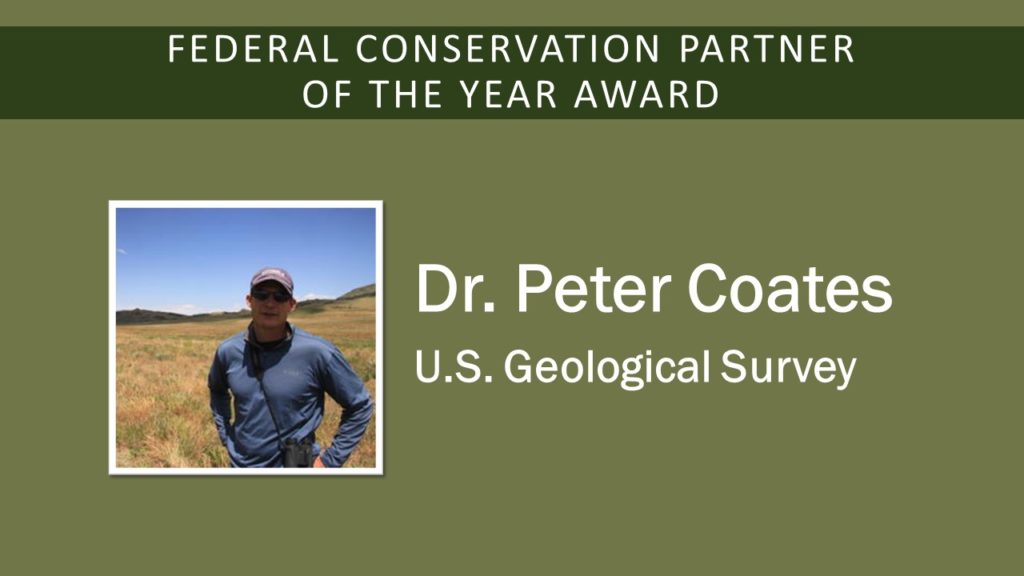
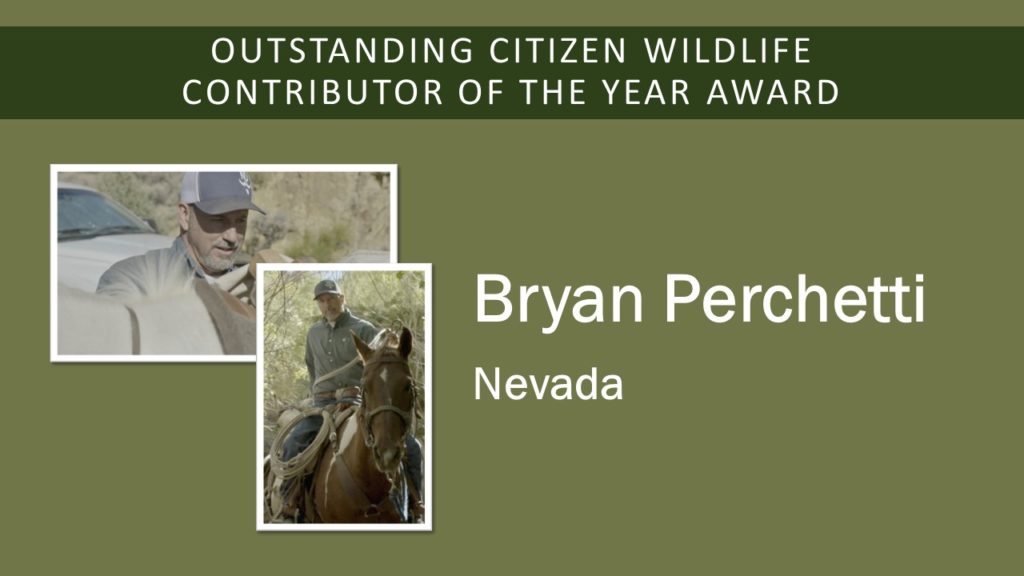
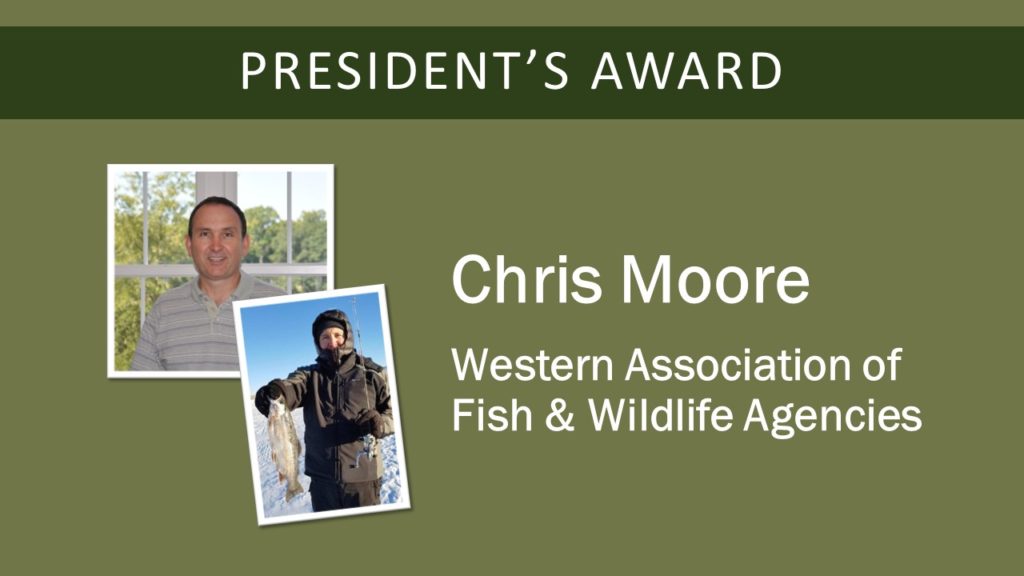
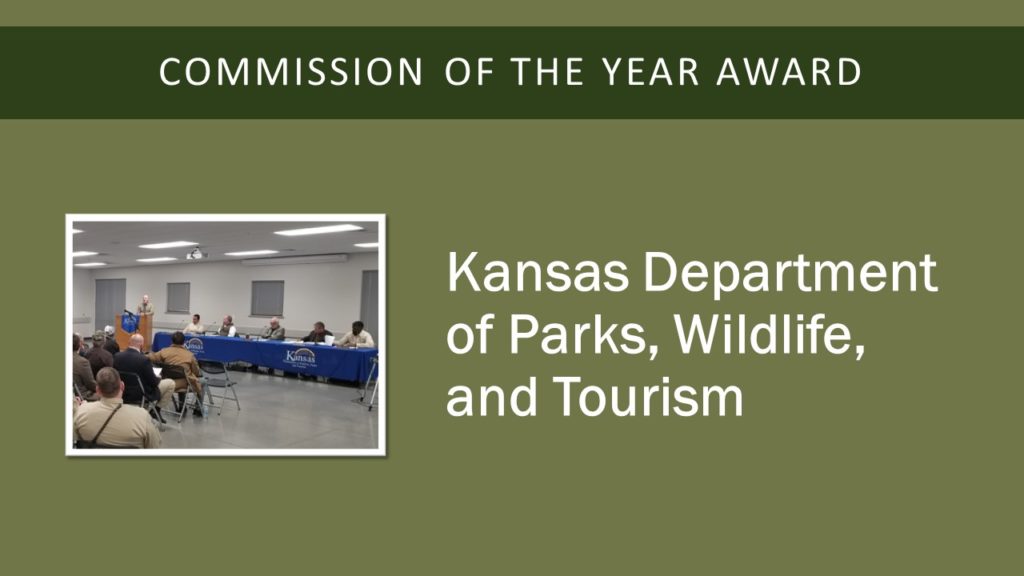
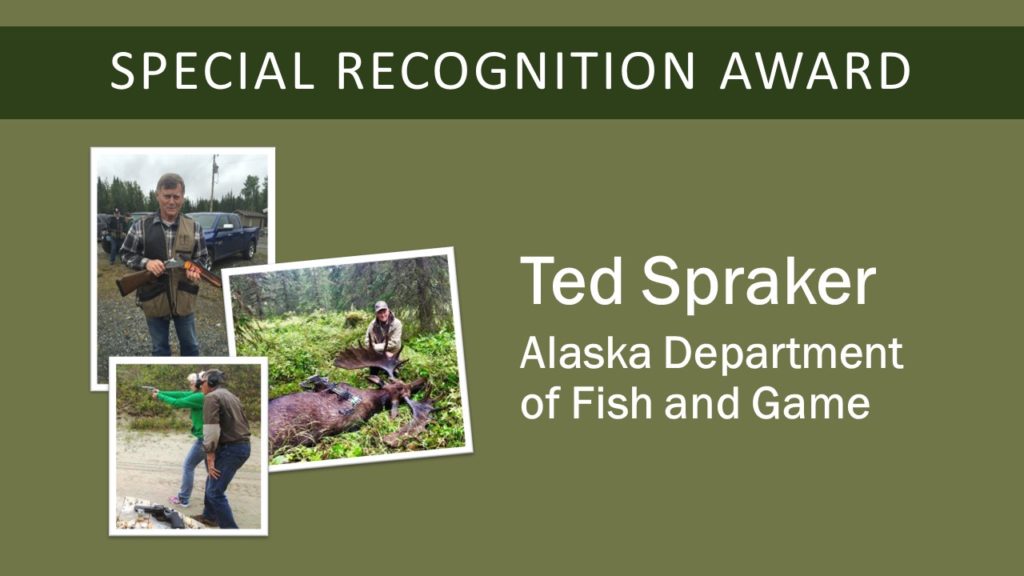
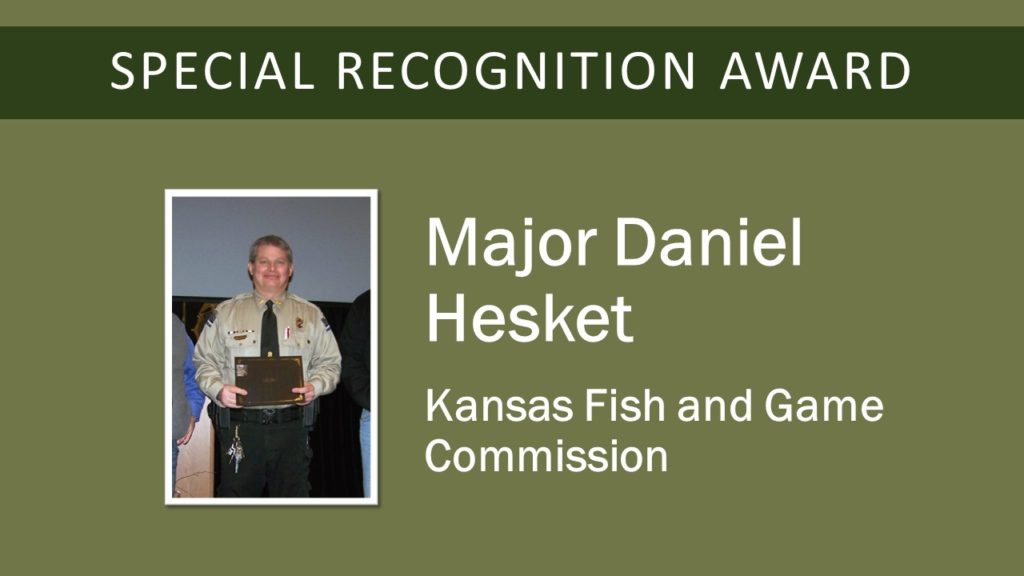
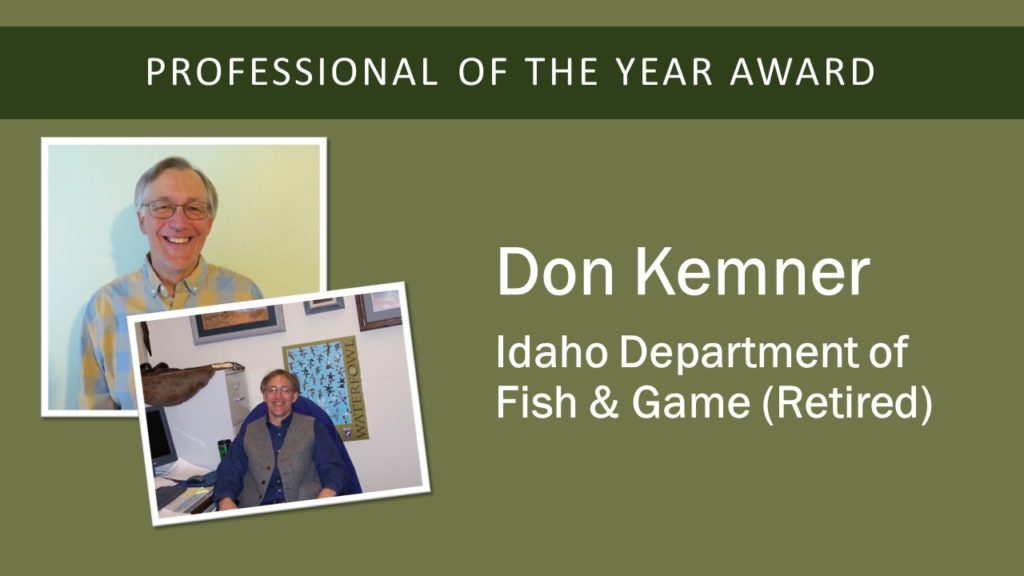
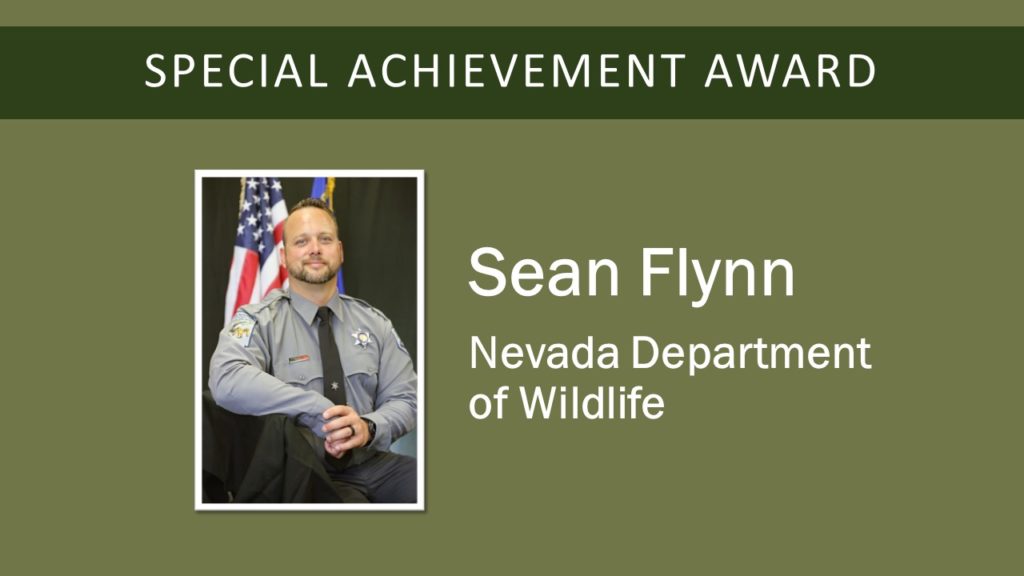
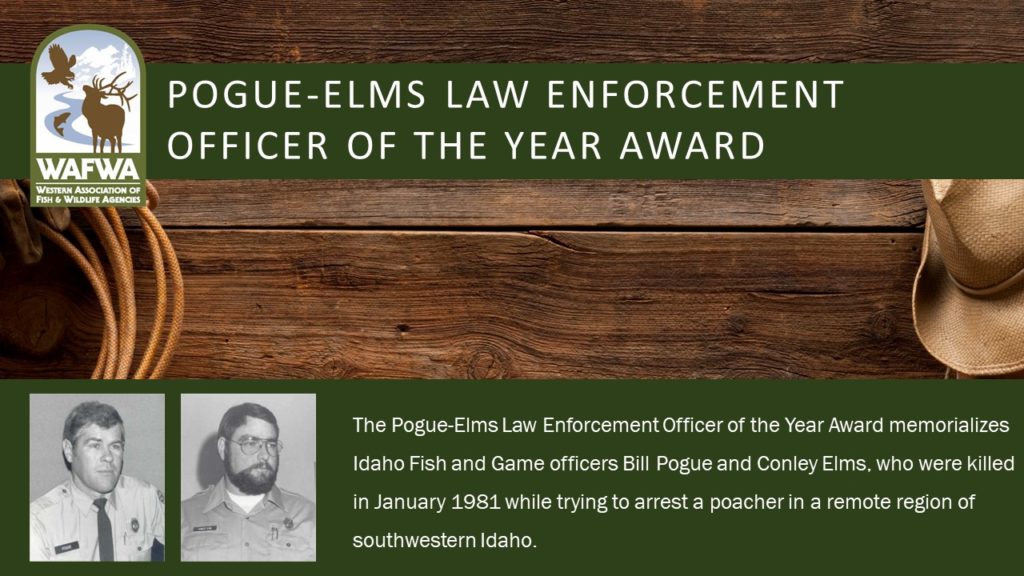
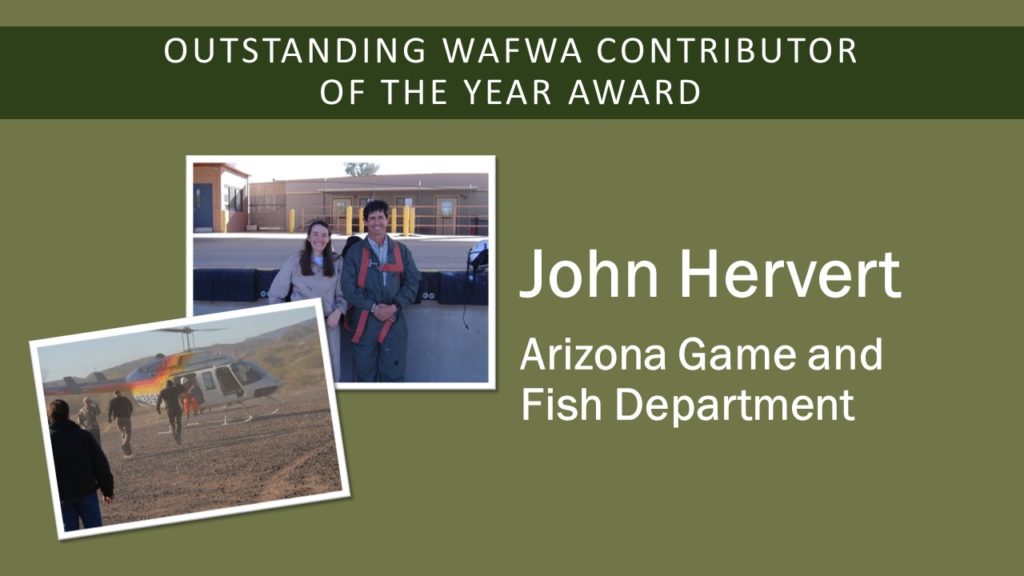
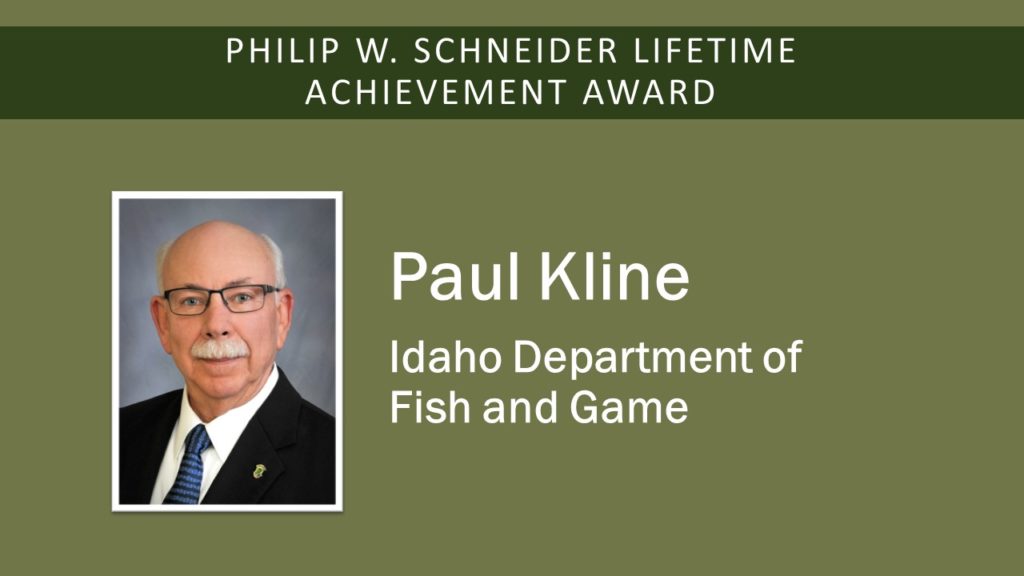
Comments (0)